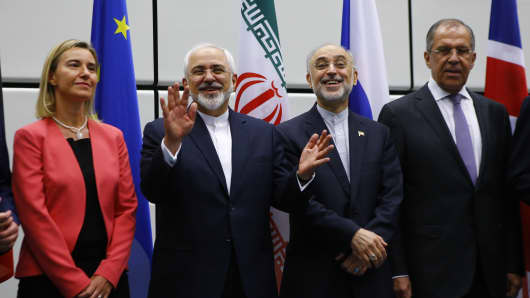I know it's hard to love the financial markets right now with all the steep selloffs and wild swings. But love them or hate them, they always send you a clear message at any given moment in time whether it's stocks, bonds, commodities or any other place where something is bought and sold.
In other words, if Apple stock is up when you're checking the latest quotes it means the buyers like the stock at that price right now no matter what they might be saying about it publicly. Money talks and b.s. walks, and what people do with their money is almost always a much better indicator of what they really believe than the what they say. It's what I love best about the markets; whether I like what they're telling me or not, I appreciate the immediate honesty.
Investors and consumers aren't the only ones who speak most honestly through the markets. Nation states do it too and it's always a good idea to see how governments are spending money instead of just listening to what the politicians are saying. What's transpiring right now in the Middle East is just the latest and greatest example.
Read MoreOil is already erasing Iran's nuke deal haul
Israel remains the biggest critic of the deal with Iran to supposedly freeze Tehran's nuclear weapons program. But we've known for months that Arab nations in the region also oppose the deal, even as many of the leaders of those nations have recently come out with lukewarm statements in favor of the deal.
The market reaction tells a different story. In this case, the nuclear arms markets. Officially it's the market for nuclear power, but when oil rich Arab nations suddenly clamor for nuclear power plants you know what's really going on. And several news reports today out of the Middle East say Russia is close to signing deals with Egypt, Jordan and the United Arab Emirates to bring nuclear power to those countries. Saudi Arabia is reportedly helping these countries fund the deals.
In other words, the market abhors a vacuum or an imbalance. And while President Obama and other politicians say the deal with Iran will stop the Mullahs from getting a nuclear weapon, the market sees the deal as just the opposite. Everyone else in the region now believes Iran is assured of getting a nuclear weapon within ten years or less, thanks to this deal. And everyone else is responding by putting their money, or new money from the Saudis, where their mouths aren't and hurrying to sign deals with Russia to boost their nuclear programs as a deterrent. It's the beginning of a nuclear arms race in the Middle East instead of some kind of nuclear freeze or the de-escalation our politicians are promising us. And anyone who understands how markets work knew this was going to happen.
Read MoreForget emails, the markets could doom Hillary
This goes beyond nuclear power or potential nuclear weapons. Sales of conventional weapons to Middle Eastern countries including Iran have been soaring all year, and even the U.S. is profiting from it. This April was the busiest month, with sales of weapons from the U.S. to foreign countries tripling from the April totals from last year. There's no sign of any let up as the Iranians are also boosting their conventional arsenal to deter the conventional buildups by its neighbors.
The stock market is telling us the same story. Before the downturn in the overall market began about a week ago, defense contractors like Lockheed Martin, Raytheon, Norhrop Grumman, and even Boeing were nicely higher from a year ago. In fact, Lockheed and Northrop Grumman are still strongly higher from last August even with this sharp selloff. You could make an argument that based on this Middle Eastern arms buildup, the defense stocks as a whole will be among the first to rebound when current carnage subsides.
President Obama and the nuclear deal's supporters keep touting this agreement as a move to avoid war. But it's all talk. What the market says carries more weight. And the market says the Middle East is gearing up for war.



